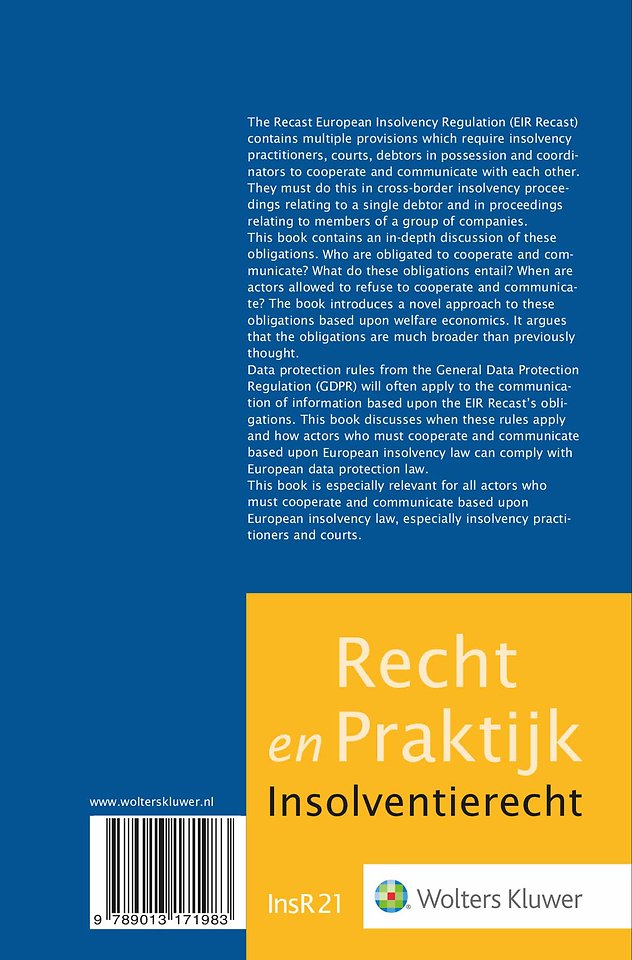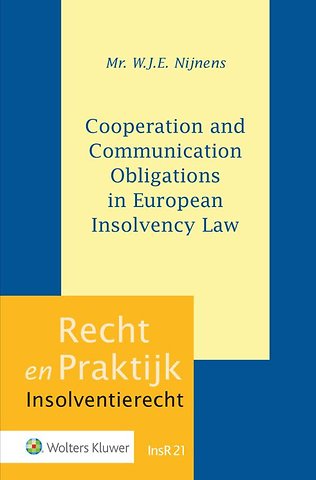Cooperation and Communication Obligations in European Insolvency Law
Gebonden Engels 2023 1e druk 9789013171983Samenvatting
Current European laws aim to intensify cooperation among a variety of insolvency procedures. But who exactly are obligated to cooperate and communicate? What do these obligations entail? When are actors allowed to refuse to cooperate and communicate? The book introduces a novel approach to these obligations based upon welfare economics.
The Recast European Insolvency Regulation (EIR Recast) contains multiple provisions which require insolvency practitioners, courts, debtors in possession and coordinators to cooperate and communicate with each other. They must do this in cross-border insolvency proceedings relating to a single debtor and in proceedings relating to members of a group of companies. There have been various academic initiatives to offer practitioners tools to collaborate and communicate with each other. However, a comprehensive analysis of all cooperation and communication obligations has not yet been carried out.
Cooperation and Communication Obligations in European Insolvency Law is the first publication to offer an in-depth discussion of these obligations following the ever-increasing Europeanization of insolvency law. Who are obligated to cooperate and communicate? What do these obligations entail? Under what circumstances are actors allowed to refuse to cooperate and communicate? The book introduces a novel approach to these obligations based upon welfare economics. The author argues that the obligations are much broader than previously thought.
Data protection rules from the General Data Protection Regulation (GDPR) will often apply to the communication of information based upon the EIR Recast’s obligations. The author discusses when these rules apply and how actors who must cooperate and communicate based upon European insolvency law can comply with European data protection law.
This pioneering publication is especially relevant for all actors who must cooperate and communicate based upon European insolvency law, especially insolvency practitioners and courts.
Trefwoorden
Specificaties
Lezersrecensies
Inhoudsopgave
PREFACE VII
ABBREVIATIONS XIII
1 INTRODUCTION 1
1.1 Subject 1
1.2 Importance 4
1.3 Methodology 6
1.3.1 Doctrinal Research 6
1.3.2 Legal Theory 8
2 COOPERATION AND COMMUNICATION OBLIGATIONS IN EUROPEAN INSOLVENCY LAW 11
2.1 Overview of European Insolvency Law 11
2.1.1 The EIR Recast 11
2.1.1.1 Modified Universalism 12
2.1.1.2 One Debtor, One COMI 14
2.1.2 EIR 2000 and EIR Recast 15
2.1.3 The Virgós-Schmit Report 16
2.1.4 Directive on Restructuring and Insolvency 17
2.1.5 Best Practices 19
2.1.5.1 CoCo Guidelines 19
2.1.5.2 EU JudgeCo Principles and Guidelines 20
2.1.5.3 UNCITRAL 21
2.1.5.3.1 Model Law on Cross-Border Insolvency 21
2.1.5.3.2 Legislative Guide on Insolvency Law Part III 22
2.1.5.3.3 Practice Guide on Cross-Border Insolvency Cooperation 22
2.1.5.3.4 Model Law on Enterprise Group Insolvency 23
2.2 Cooperation and Communication Based upon the EIR 2000 23
2.2.1 Between Liquidators 24
2.2.1.1 Communication 24
2.2.1.2 Cooperation 26
2.2.1.3 Submitting Proposals 27
2.2.1.4 Sanctions and Liability 28
2.2.2 Disputed Matters 29
2.2.2.1 Cooperation and Communication between Courts 29
2.2.2.2 Cooperation and Communication between Liquidators in Secondary and Territorial Proceedings 30
2.2.2.3 Dominance of Main Proceedings 33
2.2.2.3.1 Proposals 33
2.2.2.3.2 Cooperation and Communication 34
2.3 Conclusions from the Heidelberg-Luxembourg-Vienna Report 35
2.3.1 Regarding a Single Debtor 35
2.3.2 Regarding Groups of Companies 38
2.4 The Commission’s Proposal to Amend the EIR 2000 39
2.5 Cooperation and Communication Based upon the EIR Recast 41
2.5.1 Cooperation and Communication between Insolvency Practitioners 41
2.5.1.1 Addressees 41
2.5.1.1.1 Main, Secondary, and Territorial Proceedings 42
2.5.1.1.2 Groups of Companies 48
2.5.1.2 Background: The Functions of Secondary Proceedings 57
2.5.1.3 Background: The Function of Cooperation and Communication Regarding Groups of Companies 60
2.5.1.4 A Novel Efficiency-Based Approach 62
2.5.1.5 Contents: General Overview 64
2.5.1.6 The Moment from Which the Obligations Apply 66
2.5.1.7 The General Obligations 67
2.5.1.8 Forms of Cooperation; Protocols 70
2.5.1.9 Limits to Cooperation 71
2.5.1.9.1 Costs and Other Disadvantages: Proceedings Relating to a Single Debtor 74
2.5.1.9.2 Costs and Other Disadvantages: Proceedings Relating to Members of a Group of Companies 83
2.5.1.10 Specifications of Cooperation 88
2.5.1.10.1 Communication 89
2.5.1.10.2 Restructuring 98
2.5.1.10.3 Realisation and Use of Assets and Affairs; Proposals 102
2.5.1.10.4 Granting Additional Powers and the Allocation of Certain Tasks 105
2.5.1.11 Interim Conclusion 108
2.5.2 Cooperation and Communication between Courts 108
2.5.2.1 Addressees 108
2.5.2.2 Contents: General Overview 114
2.5.2.3 General Obligation 114
2.5.2.4 Means and Examples of Cooperation 116
2.5.2.5 The General Limitation 120
2.5.2.6 Direct Communication 127
2.5.2.7 The Specific Limitation 131
2.5.2.8 Appointing Independent Persons or Bodies 132
2.5.2.9 Interim Conclusion 139
2.5.3 Cooperation and Communication between Insolvency Practitioners and Courts 140
2.5.3.1 Addressees 140
2.5.3.2 The Obligation 141
2.5.3.3 Means of Cooperation 149
2.5.3.4 The Limitation 151
2.5.3.5 Interim Conclusion 153
2.5.4 Cooperation and Communication Involving Coordinators 154
2.5.4.1 Group Coordination Proceedings: A General Overview 154
2.5.4.2 Addressees 156
2.5.4.3 The General Obligation 160
2.5.4.4 The Limitation 163
2.5.4.5 Communication 168
2.5.4.6 Interim Conclusion 172
3 DATA PROTECTION AND ITS IMPACT ON COOPERATION AND COMMUNICATION 173
3.1 Scope 173
3.1.1 Material Scope 173
3.1.1.1 Personal Data 174
3.1.1.1.1 Information 175
3.1.1.1.2 Relating to 176
3.1.1.1.3 Natural Persons 177
3.1.1.1.4 Identified or Identifiable Natural Persons 180
3.1.1.1.5 Interim Conclusion 186
3.1.1.2 Processing 187
3.1.1.3 Automated Means and Filing Systems 188
3.1.1.4 Potential Exceptions 190
3.1.2 Territorial Scope 190
3.1.3 Interim Conclusion 192
3.2 Actors 192
3.2.1 The Legal Framework 193
3.2.1.1 Controller 193
3.2.1.1.1 Potential Controllers 193
3.2.1.1.2 Determining Purposes and Means 194
3.2.1.2 Joint Controllers 196
3.2.1.3 Processor 197
3.2.2 Application 199
3.2.2.1 Insolvency Practitioners 199
3.2.2.2 Debtors in Possession 202
3.2.2.3 Courts 202
3.2.2.4 Coordinators 203
3.2.2.5 Independent Persons or Bodies 203
3.3 Data Protection Principles 206
3.3.1 Lawfulness, Fairness and Transparency, and Purpose Limitation 206
3.3.1.1 Lawfulness and Purposes 206
3.3.1.2 Legitimate Bases 209
3.3.1.2.1 Consent 210
3.3.1.2.2 Performance of a Contract 212
3.3.1.2.3 Compliance with a Legal Obligation 213
3.3.1.2.4 Protection of Vital Interests 216
3.3.1.2.5 Task in the Public Interest or in the Exercise of Official Authority 217
3.3.1.2.6 Legitimate Interests 218
3.3.1.2.7 Interim Conclusion 220
3.3.1.3 Further Processing for a Different Purpose 220
3.3.1.4 Interim Conclusion 223
3.3.1.5 Fairness and Transparency 223
3.3.2 Data Minimisation and Storage Limitation 229
3.3.3 Accuracy, Integrity and Confidentiality, and Accountability 231
3.4 Final Considerations 234
3.5 Interim Conclusion 235
4 THESES 237
4.1 European Insolvency Law 237
4.1.1 Cooperation and Communication in General 237
4.1.2 Main, Secondary, and Territorial Insolvency Proceedings 239
4.1.3 Group of Companies 240
4.2 The Impact of General Data Protection Law 241
5 THESEN 243
5.1 Europees Insolventierecht 243
5.1.1 Samenwerking en Communicatie in het Algemeen 243
5.1.2 Hoofdinsolventieprocedures, Secundaire Insolventieprocedures en Territoriale Insolventieprocedures 245
5.1.3 Groepen Ondernemingen 246
5.2 De Impact van het Gegevensbeschermingsrecht 247
References 249
Index 261
Case Law 265
Legal Provisions 267
Anderen die dit boek kochten, kochten ook
Rubrieken
- advisering
- algemeen management
- coaching en trainen
- communicatie en media
- economie
- financieel management
- inkoop en logistiek
- internet en social media
- it-management / ict
- juridisch
- leiderschap
- marketing
- mens en maatschappij
- non-profit
- ondernemen
- organisatiekunde
- personal finance
- personeelsmanagement
- persoonlijke effectiviteit
- projectmanagement
- psychologie
- reclame en verkoop
- strategisch management
- verandermanagement
- werk en loopbaan









